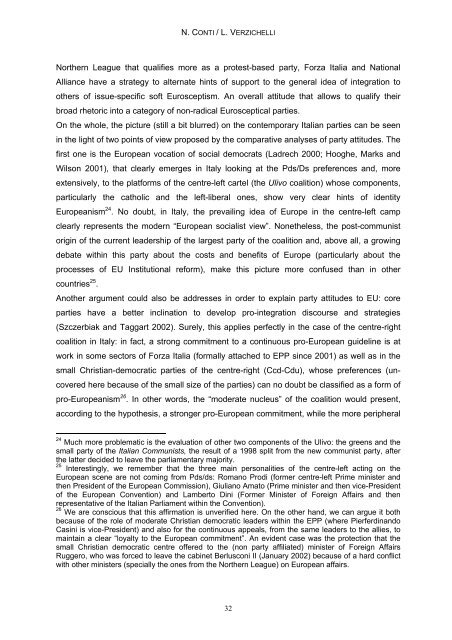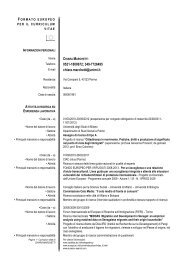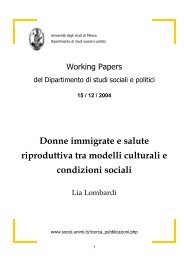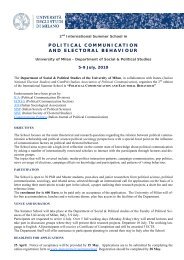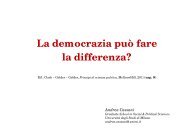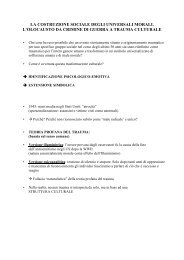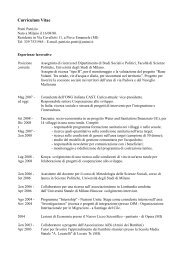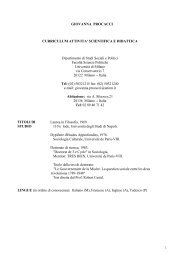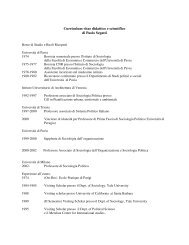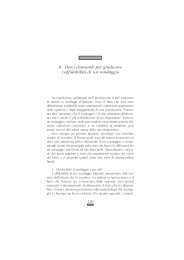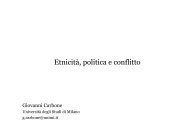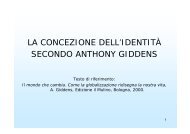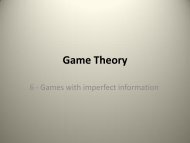The european dimension of political discourse in Italy. A ... - CIRCaP
The european dimension of political discourse in Italy. A ... - CIRCaP
The european dimension of political discourse in Italy. A ... - CIRCaP
Create successful ePaper yourself
Turn your PDF publications into a flip-book with our unique Google optimized e-Paper software.
N. CONTI / L. VERZICHELLI<br />
Northern League that qualifies more as a protest-based party, Forza Italia and National<br />
Alliance have a strategy to alternate h<strong>in</strong>ts <strong>of</strong> support to the general idea <strong>of</strong> <strong>in</strong>tegration to<br />
others <strong>of</strong> issue-specific s<strong>of</strong>t Eurosceptism. An overall attitude that allows to qualify their<br />
broad rhetoric <strong>in</strong>to a category <strong>of</strong> non-radical Eurosceptical parties.<br />
On the whole, the picture (still a bit blurred) on the contemporary Italian parties can be seen<br />
<strong>in</strong> the light <strong>of</strong> two po<strong>in</strong>ts <strong>of</strong> view proposed by the comparative analyses <strong>of</strong> party attitudes. <strong>The</strong><br />
first one is the European vocation <strong>of</strong> social democrats (Ladrech 2000; Hooghe, Marks and<br />
Wilson 2001), that clearly emerges <strong>in</strong> <strong>Italy</strong> look<strong>in</strong>g at the Pds/Ds preferences and, more<br />
extensively, to the platforms <strong>of</strong> the centre-left cartel (the Ulivo coalition) whose components,<br />
particularly the catholic and the left-liberal ones, show very clear h<strong>in</strong>ts <strong>of</strong> identity<br />
Europeanism 24 . No doubt, <strong>in</strong> <strong>Italy</strong>, the prevail<strong>in</strong>g idea <strong>of</strong> Europe <strong>in</strong> the centre-left camp<br />
clearly represents the modern “European socialist view”. Nonetheless, the post-communist<br />
orig<strong>in</strong> <strong>of</strong> the current leadership <strong>of</strong> the largest party <strong>of</strong> the coalition and, above all, a grow<strong>in</strong>g<br />
debate with<strong>in</strong> this party about the costs and benefits <strong>of</strong> Europe (particularly about the<br />
processes <strong>of</strong> EU Institutional reform), make this picture more confused than <strong>in</strong> other<br />
countries 25 .<br />
Another argument could also be addresses <strong>in</strong> order to expla<strong>in</strong> party attitudes to EU: core<br />
parties have a better <strong>in</strong>cl<strong>in</strong>ation to develop pro-<strong>in</strong>tegration <strong>discourse</strong> and strategies<br />
(Szczerbiak and Taggart 2002). Surely, this applies perfectly <strong>in</strong> the case <strong>of</strong> the centre-right<br />
coalition <strong>in</strong> <strong>Italy</strong>: <strong>in</strong> fact, a strong commitment to a cont<strong>in</strong>uous pro-European guidel<strong>in</strong>e is at<br />
work <strong>in</strong> some sectors <strong>of</strong> Forza Italia (formally attached to EPP s<strong>in</strong>ce 2001) as well as <strong>in</strong> the<br />
small Christian-democratic parties <strong>of</strong> the centre-right (Ccd-Cdu), whose preferences (uncovered<br />
here because <strong>of</strong> the small size <strong>of</strong> the parties) can no doubt be classified as a form <strong>of</strong><br />
pro-Europeanism 26 . In other words, the “moderate nucleus” <strong>of</strong> the coalition would present,<br />
accord<strong>in</strong>g to the hypothesis, a stronger pro-European commitment, while the more peripheral<br />
24 Much more problematic is the evaluation <strong>of</strong> other two components <strong>of</strong> the Ulivo: the greens and the<br />
small party <strong>of</strong> the Italian Communists, the result <strong>of</strong> a 1998 split from the new communist party, after<br />
the latter decided to leave the parliamentary majority.<br />
25 Interest<strong>in</strong>gly, we remember that the three ma<strong>in</strong> personalities <strong>of</strong> the centre-left act<strong>in</strong>g on the<br />
European scene are not com<strong>in</strong>g from Pds/ds: Romano Prodi (former centre-left Prime m<strong>in</strong>ister and<br />
then President <strong>of</strong> the European Commission), Giuliano Amato (Prime m<strong>in</strong>ister and then vice-President<br />
<strong>of</strong> the European Convention) and Lamberto D<strong>in</strong>i (Former M<strong>in</strong>ister <strong>of</strong> Foreign Affairs and then<br />
representative <strong>of</strong> the Italian Parliament with<strong>in</strong> the Convention).<br />
26 We are conscious that this affirmation is unverified here. On the other hand, we can argue it both<br />
because <strong>of</strong> the role <strong>of</strong> moderate Christian democratic leaders with<strong>in</strong> the EPP (where Pierferd<strong>in</strong>ando<br />
Cas<strong>in</strong>i is vice-President) and also for the cont<strong>in</strong>uous appeals, from the same leaders to the allies, to<br />
ma<strong>in</strong>ta<strong>in</strong> a clear “loyalty to the European commitment”. An evident case was the protection that the<br />
small Christian democratic centre <strong>of</strong>fered to the (non party affiliated) m<strong>in</strong>ister <strong>of</strong> Foreign Affairs<br />
Ruggero, who was forced to leave the cab<strong>in</strong>et Berlusconi II (January 2002) because <strong>of</strong> a hard conflict<br />
with other m<strong>in</strong>isters (specially the ones from the Northern League) on European affairs.<br />
32


